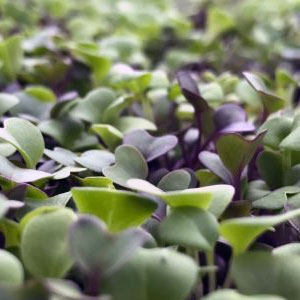
Victory Aquaponics is able to sell fresh lettuce, kale, swiss chard and more throughout the entire year to local farm markets using their climate-controlled greenhouse. Ross feeds the fish a vegetarian diet of organic grain. The water flows from the fish tanks into a biological filter filled with small plastic balls with spiked protrusions where the ammonia in the waste produced by the fish is converted by beneficial bacteria first into nitrites then nitrates which is what the plants thrive on.
Londonderry, NH 03038
By Deborah Curtin (May 7, 2016)
Understanding Victory Aquaponics’ unique farm system begins with understanding the meaning of aquaponics. According to Webster’s Dictionary, it is “a system of growing plants in the water that has been used to cultivate aquatic organisms.” It combines aquaculture—the cultivation of aquatic organisms such as fish or shellfish, especially for food—with hydroponics in which plants are grown in water. The key word is water, as the plants in the greenhouse are grown in water. There is no soil. The fish provide the nitrates that the plants need. This “circle of life” method has been in existence for centuries in other cultures.
Ross Williams hails from New Zealand and is from a farming background. Coming to the United States, he began working for Apple computer. In 2010 he had the opportunity to begin a new career and went back to his farm roots. He invested in an aquaponics startup in the basement of his home in Winchester, Massachusetts. This was what he wanted to do. In 2012 the business moved to Londonderry where it continues to evolve.
The name “Victory” was a suggestion of his son Gavin. The fascinating history of the Victory Garden goes back to WWI, the depression era, and WWII when many people supplemented rationed food with food they grew themselves. The word “victory” is symbolic as it means “success in an endeavor against the odds.” Ross has struggled and has succeeded along the way by learning from his mistakes.
Victory Aquaponics Method
The greenhouse is a two story 3,000 square foot structure located in an open, yet woodsy area near Scobie Pond in Londonderry.
In the first floor foundation are five round plastic tanks that hold 650 gallons of clean water and fish. Ross’ freshwater fish choices are goldfish and tilapia where the water temperatures in the tanks are kept at 70 degrees using a wood boiler to continually heat 800 gallons. A specific flow rate is maintained for each tank, as water coming in continually mixes with the fish waste, settling in one tank and continues out through an organized array of piping. The entire system Ross has developed uses 14,000 gallons of water which is pumped through a heat exchanger. This water is filtered and recycled over and over, and on average only ten percent dissipates through evaporation.
Ross feeds the fish a vegetarian diet of organic grain. The water flows from the fish tanks into a biological filter filled with small plastic balls with spiked protrusions where the ammonia in the waste produced by the fish is converted by beneficial bacteria first into nitrites then nitrates which is what the plants thrive on. This process is known as the nitrogen cycle.
To prevent fish eggs from entering the system, he has designed a tubular socktype adaption to the water line. This prevents any eggs from reaching the plants, as the hatchlings would eat the roots of the plants. So in one sense the fish help, but in another they can cause the demise of the vegetables.
The top floor is the greenhouse which is full of lush plants in various stages of growth, from seedlings to maturing vegetables. The variety of lettuce greens that are grown are Bibb, red and green oak leaf, romaine, and their best seller, butter lettuce. They also grow kale, Swiss chard, Bok Choy, and leeks. Cucumbers, tomatoes, and squash varieties are grown, but they are working to figure out what varieties of each will grow better during the winter months. With Gavin’s expertise in developing security programs, they have added a camera system which is linked from their computer network and remotely monitors all areas of the greenhouse building. In the event of a sudden change of temperature, their application can be activated to unroll the heat blanket or shade curtain over the ceiling of the greenhouse. They are able to see if the outside roof venting has been opened or closed or if there are other problem areas.
Victory Aquaponics also raises laying hens which are freeroaming on the property. They have over four dozen New Hampshire Reds, and Black and Red Sex Links. The latter are crossbred and extremely good egg layers. The large family dog, Leroy, is their guardian and protector who nestles among the brood keeping them safe from predators.
Currently, Ross sells his produce and eggs at the Salem and Merrimack, NH, farmer’s markets. He is contemplating offering tilapia for sale. His produce is always available to local restaurants. Victory Aquaponics has a spot at the Earth Day event at Stonyfield Yogurt in Londonderry on May 14, 2016 from 10 a.m. to 1 p.m. Ross would love nothing better than to share the science, math, technology, and arts of Victory Aquaponics and offer seminars for school groups or garden clubs in order to teach others all the benefits of aquaponics.
For farm products and any other information please contact:
Ross Williams
17 Brewster Road
Londonderry, NH
781-974-0908
Leave a message on Facebook at www.facebook.com/victoryaquaponics or send an email to Victoryaquaponics@icloud.com
